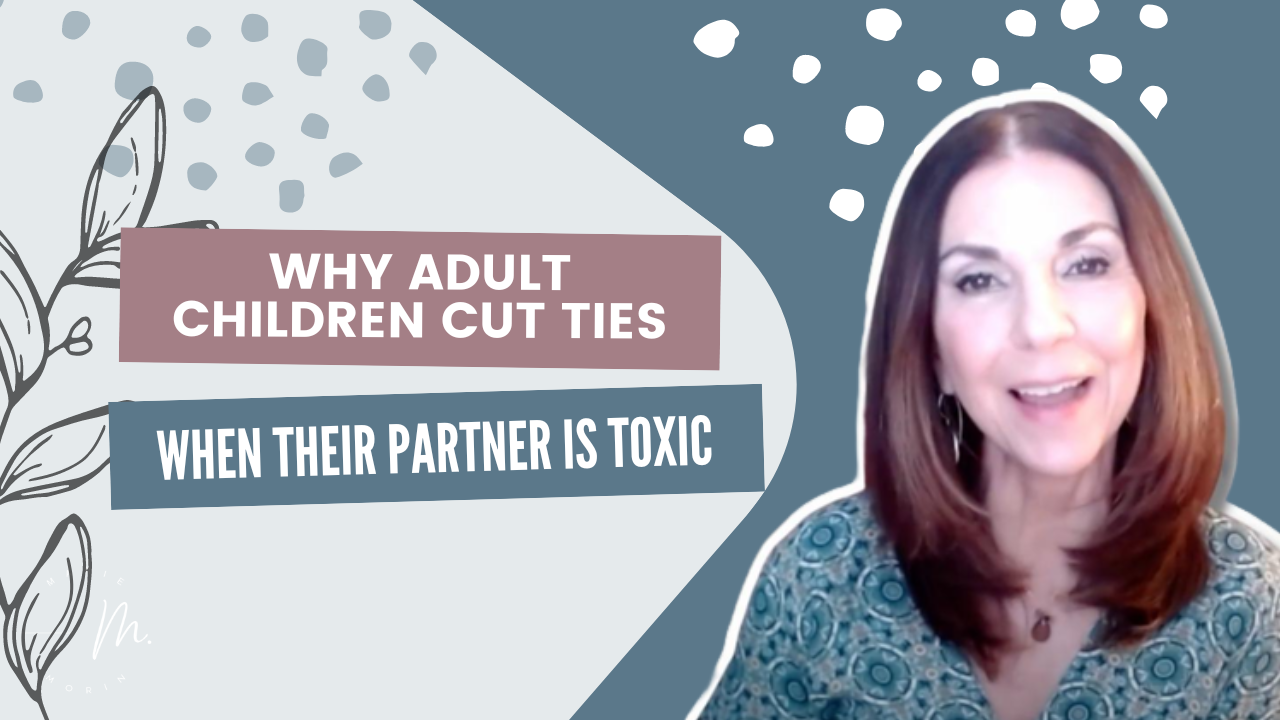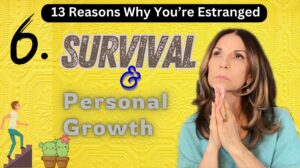Adult kids estrange when the relationship with their parents becomes too challenging to maintain. How does this happen to families? Families experiencing differing values, mental illness, substance use, poor parenting, toxic parents, divorce, and parental alienation can push relationships to the edge. Simultaneous factors contribute to adult children cutting off.
But what happens when your adult child’s spouse doesn’t like you?
Perhaps this spouse is insecure, troubled, and uncomfortable with your comments or relationship with your adult child. Parents of adult children with toxic spouses are vulnerable to estrangement. Parents can feel unprepared and discarded when their adult child’s spouse is toxic. What is behind families falling victim to the same heartbreak that twenty-seven percent of United States citizens have? Are sons or daughters more vulnerable to estrange? This article discusses Six Reasons Why Adult Children Cut Ties When Their Partner is Toxic.
Joshua Coleman, author of Rules of Estrangement Why Adult Children Cut Ties and How to Heal the Conflict, illuminates adult children’s tendency to cut ties with their parents. Coleman was estranged from his daughter and has since reconciled and presents a compassionate and practical treatise on parental estrangement. According to Coleman, the most common reasons why kid cut ties are divorce, parental alienation, differing values and lifestyles, mental illness and substance use, and the overly close parent-child relationship.
Research is clear that multiple reasons can co-occur to create the perfect storm of conditions for estrangement. Societal change, unmet expectations, blaming parents, money, and ineffective communication patterns can impact the degeneration of family connections. Coleman describes separation stemming from daughter in laws and son in laws as the cult of one. Consider the possible combination of factors and your adult child’s partner as fuel for a parent’s worst nightmare. Their adult child chooses their spouse and disconnects from their relationship with their partner.
What are the characteristics of a toxic spouse or partner? Typical toxic behaviors can drive the parent away, slowly creating an atmosphere of tension and grief.
Toxic Partner Behaviors
- A lot of drama
- Controlling
- High expectations and demands
- High dissatisfaction with their partner
- Angry outbursts or fits
- Selfishness
- Highly critical
- Contemptuous
- Dismissive superiority
Estrangement is rarely a straight line but rather a jagged history of complicated factors. Parents can suffer guilt and shame over what went wrong. They may proudly posture and further push their adult child away. Parents must proceed with caution when dealing with an adult child who has chosen this toxic partner.
Joshua Coleman’s Six Reasons Why Adult Children Cut Ties When Their Partner is Toxic
- The adult child is in a relationship with someone insecure and troubled. Partners are threatened by any relationship their spouse maintains. The adult child’s attachment with family or friends is uncomfortable. The partner slowly encourages a dissolution of any attachment to others except the partner and hers or his family. The adult child may be trying to reduce conflict with a difficult partner.
- The adult child may use the cut-off as an opportunity to define oneself.
- Parents can drive their adult child into the arms of a troubled spouse or partner by challenging their choice and questioning their thinking about the relationship. Problems evolve when adult children have reason to believe their parent’s comments or criticisms are judgmental and question their taste.
- By choosing their partner over their parents, they assert their right to choose.
- If the adult child’s partner has a history of problems with their family, they will likely have issues with their partner’s family. They would probably see you as controlling if they felt their family behaved similarly. Your input, however, well-meaning may be provoking and cause an overreaction.
- Estranged partners from their families may encourage your child to cut ties.
Parents of estranged adult children describe their experience as devastating and overwhelming.
Kids that discard and disconnect their parents are hurting as well. All parties suffer the stress of disjointed families. Coleman outlines the vulnerabilities of sons and daughters falling prey to toxic spouses.
Are Sons More Vulnerable than daughters after Marriage?
- According to Coleman, men pay a higher price for going against their wives or partner. When a partner insists on cutting off from the son’s family, he may likely stick with her than align with his parents. She is his main person now and his primary source of support.
- Coleman says that aligning with his partner or wife expresses his masculinity. His partner may say, “I am your new family, and you should prioritize me and what is important to me.” The partner’s request places him in a vice where the option with a minor conflict is to cut ties.
- Historian Stephanie Coontz states that mother love in the 1940s and 1950s was considered abnormal in manhood. Moms were notoriously blamed for many psychological illnesses. Coontz adds that the notion of “love of mother” or “attachment to the mother” was described and understood as abnormal, an idealogy that encouraged the development of self outside of family relationships.
- Men tend to shut down and avoid how they feel because they feel overwhelmed or emotionally flooded. Marriage researcher John Gottman states that most married men derive their marital satisfaction not from sexual intimacy but from how uncritical their spouses are. Men, typically, will avoid conflict and criticism. They will even cut ties from family relationships to avoid issues with their partner or spouse.
- Men typically do not carry the role of kinkeepers in families. Women, in contrast, usually keep track of members, holidays, and birthdays and sends cards and call. Women are more likely to preserve family and hurt when relationships are strained. Interestingly, Coleman adds that when daughters-in-law are the leading cause of cutting off, she strongly links to her mother and excludes her husband’s family.
- Men are not typically kinkeepers and are likely to feel less guilty about the estrangement with parents and family. Women will be active in family gatherings, remember birthdays and holidays, and be more involved in keeping family units.
- Individuation and separation from parents and family may help the couple feel more robust and independent. Both men and women who support their spouses by estranging can feel more like adults.
Estrangement can be a grueling experience with grief, complex stress, and trauma as components. Parents are often shocked and dismayed, not knowing when or how the division will end. Grandparents are denied access to their grandchildren. “Estrangement, the physical and emotional distancing when one family member detaches from another, can be shocking. The experience of being cut off from their adult child can be more devastating than the loss of a child by death. Losing access to grandchildren is heartbreaking. When adult children cut ties due to the prompting of a toxic partner, parents are left to pick up the pieces of a disjointed family.
Are sons more vulnerable than daughters to toxic partners and estrangement? This article discusses Why Adult Children Cut Ties When Their Partner is Toxic.
The ambiguous and uncertain nature of your adult child resorting to ignoring texts and calls, avoiding contact, and not speaking to you can be disturbing. While a seemingly less than monumental event may precipitate your adult child’s “final straw,” the disintegration of connection deserves investigating. What brought you and your child to this point? Why have they decided to distance and detach? This article discusses six common reasons why estranged adult children cut off communication. In addition, essential communication skills will assist you in better listening to your adult child. “
Resources:
Agllias, Kylie. Family Estrangement A Matter Of Perspective. New York, Routledge, 2017.
Coleman, Joshua. Rules of Estrangement. New York, Harmony Books, 2020.
Morin, Marie. Feeling Heartbroken and Alone? How to Pick Up the Pieces When You are Estranged. eBook. 2022.
Morin, M.L. [Morin Holistic Therapy]. (2022, January 4 ). What is Family Estrangement? You Are Not Alone.
Morin, M.L. [Morin Holistic Therapy]. (2021, September 8). Diaphragmatic Breathing: 5 Minute Deep Breathing Exercise for Beginners.
Morin, Marie. How to Deal with Estranged Family During the Holidays (2021, November 21) Sixty and Me. https://sixtyandme.com/estranged-family-holidays/
Pillemer, Karl. Fault Lines Fractured Families and How to Mend Them. New York Penguin Random House, 2020.





